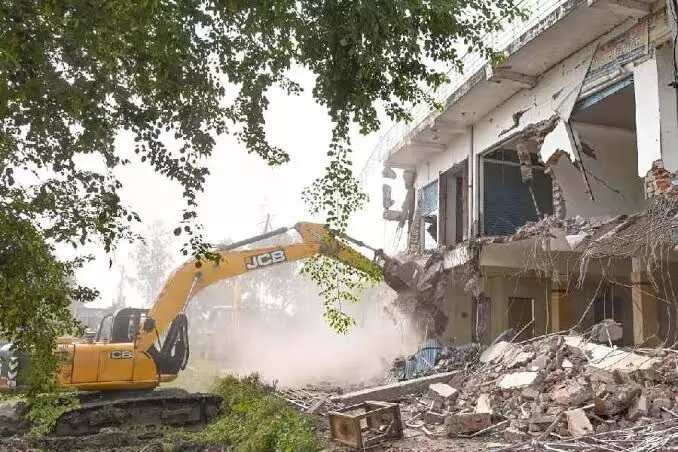SC lays down pan-India guidelines on demolition of properties
Pronouncing the verdict, Justice Gavai said it is not a happy sight to see women and children on streets overnight
By Newsmeter Network
New Delhi: Equating 'bulldozer justice' with a lawless state of affairs where might is right, the Supreme Court on Wednesday laid down pan-India guidelines and said no property should be demolished without a prior show cause notice and the affected must be given 15 days to respond.
The executive cannot assume judicial powers to punish citizens by demolishing their properties without following due process, the apex court said while terming such excesses "high-handed and arbitrary" and ruling that they need to be dealt with the "heavy hand of the law".
A bench of Justices B R Gavai and K V Viswanathan described as "chilling" the sight of a bulldozer demolishing a building, rendering women, children and aged persons homeless overnight.
"If the executive acts as a judge and inflicts penalty of demolition on a citizen on the ground that he is an accused, it violates the principle of 'separation of powers'," the bench said in its 95-page judgment.
"The chilling sight of a bulldozer demolishing a building, when authorities have failed to follow the basic principles of natural justice and have acted without adhering to the principle of due process, reminds one of a lawless state of affairs, where 'might was right'," it said.
The bench said such high-handed and arbitrary actions have no place in the Constitution, which rests on the foundation of the rule of law.
Passing a slew of directions, the bench made clear that they will not be applicable if there is an unauthorised structure in a public place such as road, street, footpath, abutting railway line or any river or water bodies and also in cases where there is an order for demolition made by a court of law.
"No demolition should be carried out without a prior show cause notice returnable either in accordance with the time provided by the local municipal laws or within 15 days time from the date of service of such notice, whichever is later," the bench directed.
The top court also observed that constitutional ethos and values would not permit any such abuse of power and such misadventures cannot be tolerated by the court of law.
"The executive cannot become a judge and decide that a person accused is guilty and, therefore, punish him by demolishing his residential/commercial property/properties. Such an act of the executive would be transgressing its limits," the bench said.
In order to allay the fears in the minds of citizens with regard to arbitrary exercise of power by the officials of the State, the top court finds it necessary to issue certain directions in exercise of power under Article 142 of the Constitution, it said.
Article 142 empowers the apex court to pass any decree or order necessary for doing complete justice in any case or matter pending before it.
Even after orders of demolition are passed, the bench said, the affected party needs to be given some time so as to challenge the order before an appropriate forum.
And even in cases of persons who do not wish to contest the demolition order, sufficient time needs to be given to them to vacate and arrange their affairs, the apex court said.
"Heavens would not fall on the authorities if they hold their hands for some period," the bench said.
It directed that notice shall be served upon the owner/occupier by a registered post. Additionally, the notice shall also be affixed conspicuously on the outer portion of the structure in question.
"The time of 15 days, stated herein above, shall start from the date of receipt of the said notice," it said.
To prevent any allegation of backdating, the bench directed that as soon as the show cause notice is duly served, intimation shall be sent to the office of the concerned collector or district magistrate digitally by e-mail.
"The collector/DM shall designate a nodal officer and also assign an e-mail address and communicate the same to all the municipal and other authorities in charge of building regulations and demolition within one month from today," it said.
The notice shall contain details regarding the nature of unauthorised construction, specific violation and the grounds of demolition, it directed.
The designated authority, the court added, shall give the person concerned an opportunity of personal hearing and pass a final order.
It said the final order should contain the contentions of the 'noticee', and if the designated authority disagrees with the same, the reasons for it.
The bench said the final order shall also contain why the extreme step of demolition is the only option available and other options like compounding and demolishing only part of the property are not available.
It also said the proceedings of demolition shall be videographed.
"Needless to state that the authorities hereinafter shall strictly comply with the aforesaid directions issued by us. It will also be informed that violation of any of the directions would lead to initiation of contempt proceedings in addition to the prosecution," the bench said.
Justice Gavai, who penned the verdict, started his judgement with a few lines of famous Hindi poet Pradeep to highlight the importance of having a home.
The top court delivered its verdict on pleas seeking framing of guidelines on demolition of properties.
Inputs from PTI